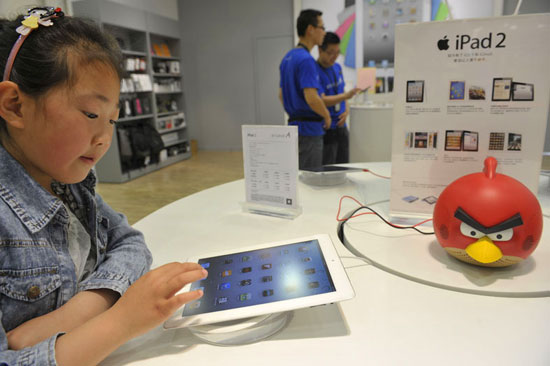
|
 |
|
An Apple store in Huai'an, Jiangsu province, on June 2, 2012. Apple Inc may open two more stores in China, which would raise its total to eight in the country. [Photo/China Daily] |
Chengdu, Shenzhen likely to host technology company's new outlets
Despite being in a trademark dispute with a company in Guangdong province, Apple Inc is considering opening two new stores in China, a step that would give it eight stores in the country.
According to interviews with Chengdu government officials, Apple plans to open a new store in Chengdu, capital of Sichuan province.
Tang Jiqiang, head of the Chengdu High-Tech Zone's development planning bureau, said Apple was invited by Chengdu Mayor Ge Honglin to open a store in the city.
Shi Lei, head of the Chengdu Investment Promotion Commission, said Apple has visited many buildings in the city in search of a site that meets requirements it has set for its stores. The locations now under consideration include buildings in Wharf Chengdu International, Financial City, Resources Vientiane City and Kaide Raffles Square.
"But I have not learned if Apple's store will be opened in Chengdu this year," Shi said.
No one in charge of investment promotion at the buildings Apple is considering would confirm if a site for the project had been chosen.
Another possible location for the store is Shenzhen, Guangdong province, according to a local media report.
It said Apple submitted documents on Monday to the local government asking for permission to open a store in Holiday Plaza, a mall in the city's Nanshan district.
Chen Sisi, who works at a security firm, said she was glad to hear the stores might be opened. She said she now uses an iPhone 3 and would like to buy an iPhone 4S and an iPad 2.
"I think the store will provide more products and more choices," she said. "I hope it will open soon."
Li Fang said her boyfriend likes Apple products and is waiting for the introduction of the iPhone 5. But he would rather buy the device in Hong Kong, where it can be had for less money.
"That's unless the Apple store sells them cheaper than they do in Hong Kong," he said. "But isn't that impossible?"
Buyers who know where to go to find cheaper prices aren't the only obstacle Apple will encounter in Shenzhen.
Proview Technology Shenzhen Co Ltd, which is based in the city, sued Apple after accusing the US company of violating one of its trademarks, a case that is still being handled by the Guangdong Provincial High People's Court.
Some local governments have meanwhile been confiscating Apple iPads, giving rise to concerns that the product won't be sold in the Chinese mainland.
To settle the trademark dispute, the US company has offered compensation to Proview Technology, Xie Xianghui, a lawyer for Proview, said recently. He said the Guangdong court is trying to mediate the dispute and that Apple and Proview are negotiating a settlement.
On 51job.com, a Chinese recruiting service website, Apple is now trying to hire managers, business specialists and customer service employees to work in Chengdu and Shenzhen.
Apple has six stores in China - two in Beijing, three in Shanghai and one in Hong Kong. The United States, in contrast, has more than 250.
The domestic IT research company Analysys International says Apple's iPad products hold about 80 percent of the Chinese market for tablet PCs, of which more than 4.5 million are expected to be shipped this year.
According to Apple's latest financial report, the company sold 11.8 million iPads during its 2012 fiscal year's second quarter, which ended on March 31.
Apple's first mainland store opened in Beijing's Sanlitun area in 2008, and China is the source of about 10 percent of the company's sales revenue, according to Tim Cook, company CEO.
The company said two years ago that it will open more than 20 stores in China by the end of 2012. With its six current stores, it can't offer enough products to meet the demand stemming from the most populous country in the world. And buyers who can't get what they want through legitimate means often turn to smuggled products.
You may contact the writers at tuoyannan@chinadaily.com.cn, and huangzhiling@chinadaily.com.cn
Huang Yuli at Shenzhen also contributed to this story.